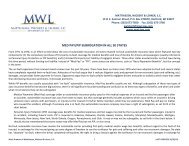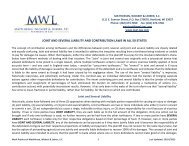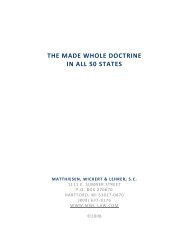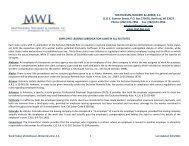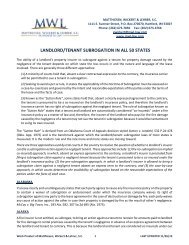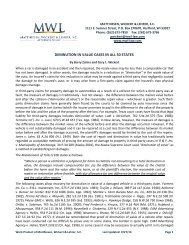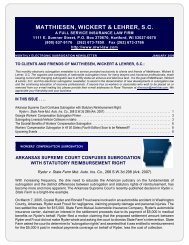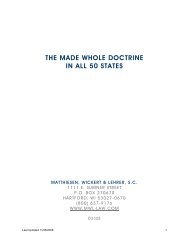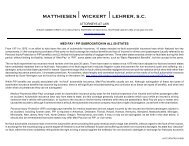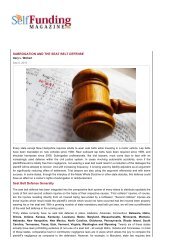spoliation of evidence in all 50 states - Matthiesen, Wickert & Lehrer
spoliation of evidence in all 50 states - Matthiesen, Wickert & Lehrer
spoliation of evidence in all 50 states - Matthiesen, Wickert & Lehrer
You also want an ePaper? Increase the reach of your titles
YUMPU automatically turns print PDFs into web optimized ePapers that Google loves.
SANCTIONS: New Mexico recognizes that <strong>spoliation</strong> <strong>of</strong> <strong>evidence</strong> may result <strong>in</strong> sanctions. These sanctions <strong>in</strong>cludedismissal or adverse <strong>in</strong>ference. Segura v. K-Mart Corp., 62 P.3d 283, 286-87 (N.M. 2002).NEW YORKTHIRD-PARTY NEGLIGENT SPOLIATION: The New York Court <strong>of</strong> Appeals decl<strong>in</strong>ed to recognize such a cause <strong>of</strong>action under the facts <strong>of</strong> Met-Life Auto & Home v. Joe Basil Chevrolet, Inc., 1 N.Y.3d 478, 807 N.E.2d 865, 775N.Y.S.2d 754 (N.Y. 2004). The Court <strong>in</strong> this case focused its decision on the non-existence <strong>of</strong> a duty giv<strong>in</strong>g rise topreservation <strong>of</strong> <strong>evidence</strong> and the lack <strong>of</strong> notice to preserve the <strong>evidence</strong> militated aga<strong>in</strong>st establish<strong>in</strong>g such acause <strong>of</strong> action.SPOLAITION BY AN EMPLOYER: Spoliation by an employer may support a common law cause <strong>of</strong> action whensuch <strong>spoliation</strong> impairs an employee’s right to sue a third-party tortfeasor. DiDomenico v. C & S AeromatikSupplies, 252 A.D.2d 41, 682 N.Y.S.2d 452 (N.Y. 2d Dept. 1998). In other <strong>in</strong>stances, New York Courts havespecific<strong>all</strong>y rejected a cause <strong>of</strong> action for <strong>spoliation</strong> <strong>of</strong> <strong>evidence</strong> when the employer was not on notice that<strong>evidence</strong> would be needed. Monteiro v. R.D. Werner Co., 301 A.D.2d 636, 754 N.Y.S.2d 328 (N.Y. 2d Dept. 2003)(employer had no duty to preserve scaffold which <strong>all</strong>egedly caused pla<strong>in</strong>tiff’s <strong>in</strong>juries and employer was not onnotice that an action was contemplated aga<strong>in</strong>st a third-party).SANCTIONS: C.P.L.R. § 3126 permits sanctions, <strong>in</strong>clud<strong>in</strong>g dismissal for a party’s failure to disclose relevant<strong>evidence</strong>. Met-Life, 1 N.Y.3d at 482-83. New York courts will impose “carefully chosen and specific<strong>all</strong>y tailoredsanctions with<strong>in</strong> the context <strong>of</strong> the underly<strong>in</strong>g action” to remedy <strong>spoliation</strong> <strong>of</strong> <strong>evidence</strong>. For <strong>in</strong>stance, adefendant may be granted summary judgment when the pla<strong>in</strong>tiff negligently fails to preserve crucial <strong>evidence</strong>.Amaris v. Sharp Elecs., 758 N.Y.S.2d 637 (N.Y. App. Div. 2003). However, award<strong>in</strong>g summary judgment to thepla<strong>in</strong>tiff for the defendant’s <strong>in</strong>tentional destruction <strong>of</strong> <strong>evidence</strong> may be too drastic a remedy. Mylonas v. Town<strong>of</strong> Brookhaven, 759 N.Y.S.2d 752, 753-754 (N.Y. App. Div. 2003). But see Herrera v. Matl<strong>in</strong>, 758 N.Y.S.2d 7, 7 (N.Y.App. Div. 2003), aff’d 771 N.Y.S.2d 347 (N.Y. A.D. 2004) (physician’s loss <strong>of</strong> records amount<strong>in</strong>g to pr<strong>of</strong>essionalmisconduct warranted strik<strong>in</strong>g <strong>of</strong> answer).NORTH CAROLINAADVERSE PRESUMPTION/INFERENCE: The North Carol<strong>in</strong>a Supreme Court recognizes a permissive, rather thanmandatory adverse <strong>in</strong>ference may be drawn aga<strong>in</strong>st a spoliator <strong>of</strong> <strong>evidence</strong>. McLa<strong>in</strong> v. Taco Bell Corp., 137 N.C.App. 179, 182-192, 527 S.E.2d 712, 715 - 721 (N.C. App. 2000). “[T]o qualify for the adverse <strong>in</strong>ference, the partyrequest<strong>in</strong>g it must ord<strong>in</strong>arily show that the spoliator was on notice <strong>of</strong> the claim or potential claim at the time <strong>of</strong>the destruction.“ McLa<strong>in</strong>, 137 N.C. App. at 187, 527 S.E.2d at 718 (quotation omitted). The obligation to preserve<strong>evidence</strong> may arise prior to the fil<strong>in</strong>g <strong>of</strong> a compla<strong>in</strong>t where the oppos<strong>in</strong>g party is on notice that litigation is likelyto be commenced. Id. The <strong>evidence</strong> lost must be “pert<strong>in</strong>ent” and “potenti<strong>all</strong>y supportive <strong>of</strong> pla<strong>in</strong>tiff’s<strong>all</strong>egations.” Id. at 188, 527 S.E.2d at 718.F<strong>in</strong><strong>all</strong>y, “[t]he proponent <strong>of</strong> a miss<strong>in</strong>g document <strong>in</strong>ference need not <strong>of</strong>fer direct <strong>evidence</strong> <strong>of</strong> a cover-up to set thestage for the adverse <strong>in</strong>ference. Circumstantial <strong>evidence</strong> will suffice.” Id. at 186, 527 S.E.2d at 718; Arndt v. FirstUnion Nat. Bank, 613 S.E.2d 274, 281-283 (N.C. App. 2005).NORTH DAKOTAADVERSE INFERENCE/SANCTIONS: Trial courts <strong>in</strong> North Dakota have the authority to sanction a party when key<strong>evidence</strong> is miss<strong>in</strong>g, “even where the party has not violated a court order and even when there has been a n<strong>of</strong><strong>in</strong>d<strong>in</strong>g <strong>of</strong> bad faith.” Bachmeier v. W<strong>all</strong>work Truck Ctrs., 544 N.W.2d 122, 124 (N.D. 1996). In sanction<strong>in</strong>g aparty, the district court should at least consider “the culpability, or state <strong>of</strong> m<strong>in</strong>d, <strong>of</strong> the party aga<strong>in</strong>st whomsanctions are be<strong>in</strong>g imposed; a f<strong>in</strong>d<strong>in</strong>g <strong>of</strong> prejudice aga<strong>in</strong>st the mov<strong>in</strong>g party, and the degree <strong>of</strong> this prejudice,<strong>in</strong>clud<strong>in</strong>g the impact it has on present<strong>in</strong>g or defend<strong>in</strong>g the case; and, the availability <strong>of</strong> less severe alternative13Work Product <strong>of</strong> <strong>Matthiesen</strong>, <strong>Wickert</strong> & <strong>Lehrer</strong>, S.C. LAST UPDATED 4/22/2013



